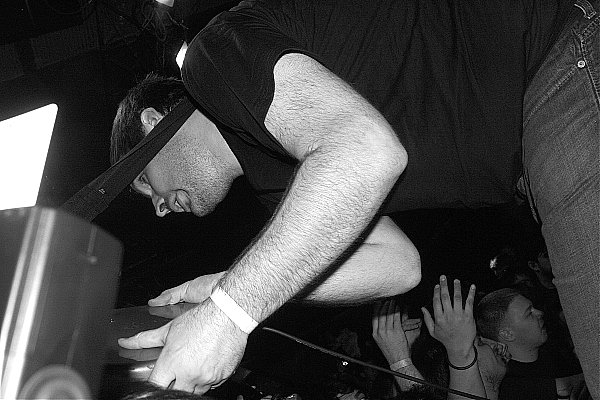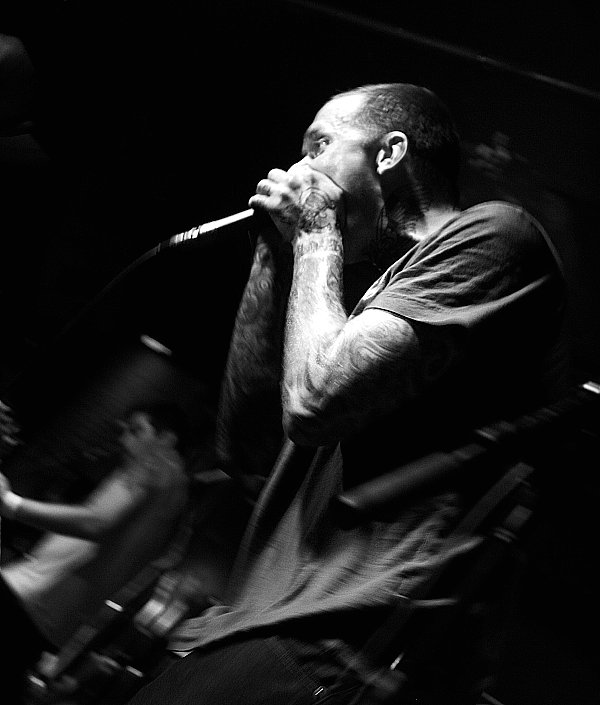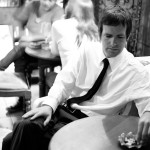
Words and Photos by Andrew Parks
Whether you’re into metal or not, you need to see Converge at least once. Aside from being one of America’s last remaining hardcore bands, they are easily one of the most intense live experiences you’ll ever endure–a blinding battering ram of a rock show that’ll probably result in a bruise or two. But hey, you’ll feel like a better person in the end. And if you’re like us, you’ll have the pictures to prove it.
The following is an interview I conducted with Converge’s guitarist/widely respected producer (Kurt Ballou) last fall. We saved it for their next headlining tour, which happens to touch down at New York’s Santos Party House tonight. That show is sold out, but you can find other dates on the group’s month-long North American trek here.
As for what’s discussed herein, expect: Ballou’s new Black Flag-meets-Birthday Party project, the band’s guest-dotted Axe To Fall album (current and former members of Neurosis, Disfear, Cave-In, Hatebreed, Genghis Tron, Undertow…), why he doesn’t listen to too much metal anymore, and much, much more.
“He was practicing so much he tore his finger apart and had to do his solo encased in Superglue.”

So the main thing that jumps out at me about this record is how you were able to make so many guests sound so seamless. It’s as if I wouldn’t know half these people contributed without looking at the liner notes.
Well, we have a long-standing friendship with all of the people on the record, plus a mutual respect and understanding of each other musically. It’s not like we chose people so we could put a sticker on the cover of the record that said, ‘Featuring so and so…’
It’s not like we told people they could do whatever they wanted, either. There was an editing process, helped along by the trust our friends have in us.
When you say things were scrapped, do you mean full songs, or just specific parts?
Not full songs; just certain people’s parts were edited or cut.
Was anything written with a certain person in mind, or did you choose everyone after the fact?
Each song was different, really. Like “Cruel Bloom” actually started as a Cave-In/Converge collaboration, but none of those guys played on it when we were writing the song. They helped embellish it, but then we stripped it back and took a different approach to it.
So it was originally going to be a heavier song?
Yeah, and when we decided to take a mellower approach to it, we thought Steve [Brodsky] would be an ideal vocalist for the song. So [frontman] Jake [Ballou] wrote some lyrics, which Steve modified and sang. Once we received what he did, we did a little bit of editing and ended up changing the chorus to a choir-type thing after the fact. We wanted it to sound like a sentimental song–the kind of thing a bunch of friends could share at the end of the day, around a fire.
There was a lot of back and forth with different people [on other songs] like that.
It’s interesting that you chose so many people to contribute to such a small part when that’s something you guys could have easily sang on your own…
Well, it started with me doing seven tracks of myself, but it didn’t sound broad enough. If I was recording someone else’s record and I was under a tighter time constraint, when it might have just been a couple people. But with a Converge record…
You’re not on the clock so much…
Well, I’m on the clock. We barely made the cutoff for this album–literally 11:30 p.m. on the last possible day we could deliver it. So we were definitely under the gun, but the little things are the difference between a good record and a great record for me.
Did Sean [Martin, ex-Hatebreed guitarist] have an extra good time since he’s pretty much given up playing metal for producing hip hop?
Yeah, he was stoked. He was practicing so much he tore apart his finger and had to do his solo encased in Superglue.
There are certainly some killer solos on the record.
Yeah, I have to mimic Sean’s live and it’s not easy.
“It’s not like our riffs are like King Crimson or Yes, but they embody that style from a philosophical or academic standpoint.”

I’ve heard your guitar style is very hard to replicate, too. Is it kinda unorthodox?
Yeah, I guess. I’m a self-taught guitarist, so I got my start by mimicking what other people do, from a musical or recording standpoint. Ultimately, it’s meant I’ve developed slower than my peers, but it’s also given me a more unique style. It’s a little more rhythmic. I’m more of a mathematician than an artist at heart, so that drives me more.
Did hearing the approaches of other guitarists to Converge songs make you want to mess around with your playing a little bit?
It definitely helped me expand what I’m doing. I have the technical chops to play what they’re doing, but it’s not something that I come across naturally.
Not to single anyone out, but are there any parts that really stuck out to you after someone sent them?
Steve’s stuff on “Effigy” is really awesome. He came out with a great melody that I’ve since learned, but I don’t think it’s a song we’ll ever play live unless we do it with Steve or another guitarist. There’s three or four guitar parts on that song–giving it a really chaotic feel–so playing with just one guitar and one bass doesn’t sound full enough [to attempt that].
The guitar solo on “Wishing Well” is pretty rad, too. I’m honored to have [Ulf Cederlund of Entombed and Disfear] on the record because I’ve been a fan of his music for a really long time. That song’s tuned in a really strange way, though.
How many of the new songs have you been playing live?
Around four songs a night. There’s maybe six or seven that we’re capable of playing live. We’ve been a band for a long time, so there’s a lot of songs we want to play in an hour. We also use a lot of different tunings, so our sets are often structured around that.
We’re also a really physical band live, and it’s hard to do that and still pull off these songs.
I read somewhere that [drummer] Ben [Koller]’s been listening to a lot of prog and you wrote some of your parts with that in mind.
Yeah, I try to tailor my writing to the abilities and tastes of the people I’m playing with. And since Ben’s been going in a prog direction with his personal taste, I did that with my guitar playing as well.
Someone casually listening probably isn’t going to pick up on that, so what’s an example?
“Dark Horse” is a good example, but the best is probably “Dead Beat.” It has a lot of abrupt, odd time signatures and guitars dancing around. It’s not like our riffs are like King Crimson or Yes, but they embody that style from a philosophical or academic standpoint.
Well, you’re putting it all into a Converge context…
That’s what we’ve done throughout our career: take an influence from one place and put it into the context of a different place. You’re taking an idea from something, not the sound.
Since most of this happened in the past year, was there ever a discussion of, “Yeah, we’re gonna bring all of these people in,” or did it happen more gradually?
Ever since we started collaborating with Cave-In a few years ago, we liked the idea of doing a collaborative record. We don’t wanna go beyond the scope of what Converge is, but we also don’t want to be repeating ourselves. One way to do that is to make yourself a little bit uncomfortable. It forces you to rethink what you’re doing and approach things a little differently.
The collaboration thing is a bit like trying to spice up a marriage isn’t it?
Yeah, we’re swingers basically. [Laughs] We’re having a key party.
And in turn, you’re forced to appreciate the people you play with regularly.
That’s true. One of the main differences between Jane Doe and When Forever Comes Crashing is the change in membership, with [bassist] Nate [Newton] and Ben [joining the band]. I’m still the primary riff writer on those records, but the change in collaborative musicians made all the difference in the world for making better music in my opinion.
“When I was younger, I remember leaving shows with something to think about every time. That doesn’t happen as much these days.”

When you said you don’t want to go too far beyond the scope of what you guys are capable of doing, does that mean you’ll never write a record with a bunch of songs that are like “Wretched World” or “Grim Heart/Black Rose?”
We could potentially have more of them on a record, but I don’t think it’s likely, just because they don’t feel like Converge songs when we play them live. an entire record like that in the foreseeable future. I’m not opposed to it, though. I like those songs as much as anything.
We’re not gonna force a song onto a record that we’re not 100-percent confident in. With that said, if you’re gonna put out an album that’s 30, 40 or 50 minutes long in this age of downloading and iPods, you need to have enough diversity on the album to hold the listener’s attention for its duration.
Do you find yourself listening to any newer metal records anymore?
Not really. Because I’m a producer, I’m listening to music 10 hours a day when I’m not on tour. And since most of the bands I record are heavier, I end up listening to mellower music. I like the shuffle function on the iPod a lot–that gives you a nice variety.
Do you have a favorite metal record this year?
Well, I just recorded a Trap Them record that’s the best thing they’ve ever done. That’s all that comes to mind right now…I really don’t keep up on current releases. I listen to mostly old stuff.
Any other anecdotes you can share about the Axe to Fall sessions?
Well, this band’s been together for 10 years, so we’re all pretty comfortable with each other. There’s the usual squabbles, but we respect one another’s opinions, so our arguments are a lot more productive than other bands. I don’t want to say this album was easy to make, but it was definitely an enjoyable process.
Was the mixing part rough since you had so many parts to make sense of?
I feel like the last record was harder than this one. It was the first time I tried doing all the mixing and recording myself, so I held myself to a really high standard on it. That last one has a bit more character in the way it sounds, too, although this one sounds better.
Character meaning happy accidents and welcome imperfections?
Yeah, the drums in particular are a little rougher around the edges, which adds some charm. This record doesn’t sound Hollywood, but it’s definitely slicker than previous ones.
You have a secret hardcore project in the works, right?
I don’t know if it’s secret. We’re still on the hunt for a singer. The drummer is Mike Justin, who’s currently playing in Earth Crisis and previously played in Trap Them, Unearth and the Red Chord. And the bassist is Tim Cohen from 108.
You’re not getting your hardcore side out enough in hardcore.
Nah, it’s not that. It’s just that I like Black Flag, Bad Brains, the Birthday Party–that sort of thing–and there’s only so far you can go with that. It’s also that Jake’s lyrics aren’t direct. They’re more artistic and personal. I appreciate that, but I also appreciate lyrics that are more outward. I don’t want to say something more hardcore or political, but maybe something that’s a little less veiled–say what you mean kind of lyrics. That makes more sense in a straight-up hardcore standpoint than a Converge one.
Plus that never happens in bands these days…
Yeah. I think that’s what it is. When I was younger, I remember leaving shows with something to think about every time. That doesn’t happen as much these days. Kids are exposed to new sounds, but not new ideologies. I don’t want to be in a preachy band. If anything, my generation put a stop to that because we were sick of the previous one…
Well, you can put your ideas out there without being militant about it.
It’s difficult to maintain that level of unrelenting idealism. You can explain what you believe, and let people follow that or not based upon the ideas you put out there.


